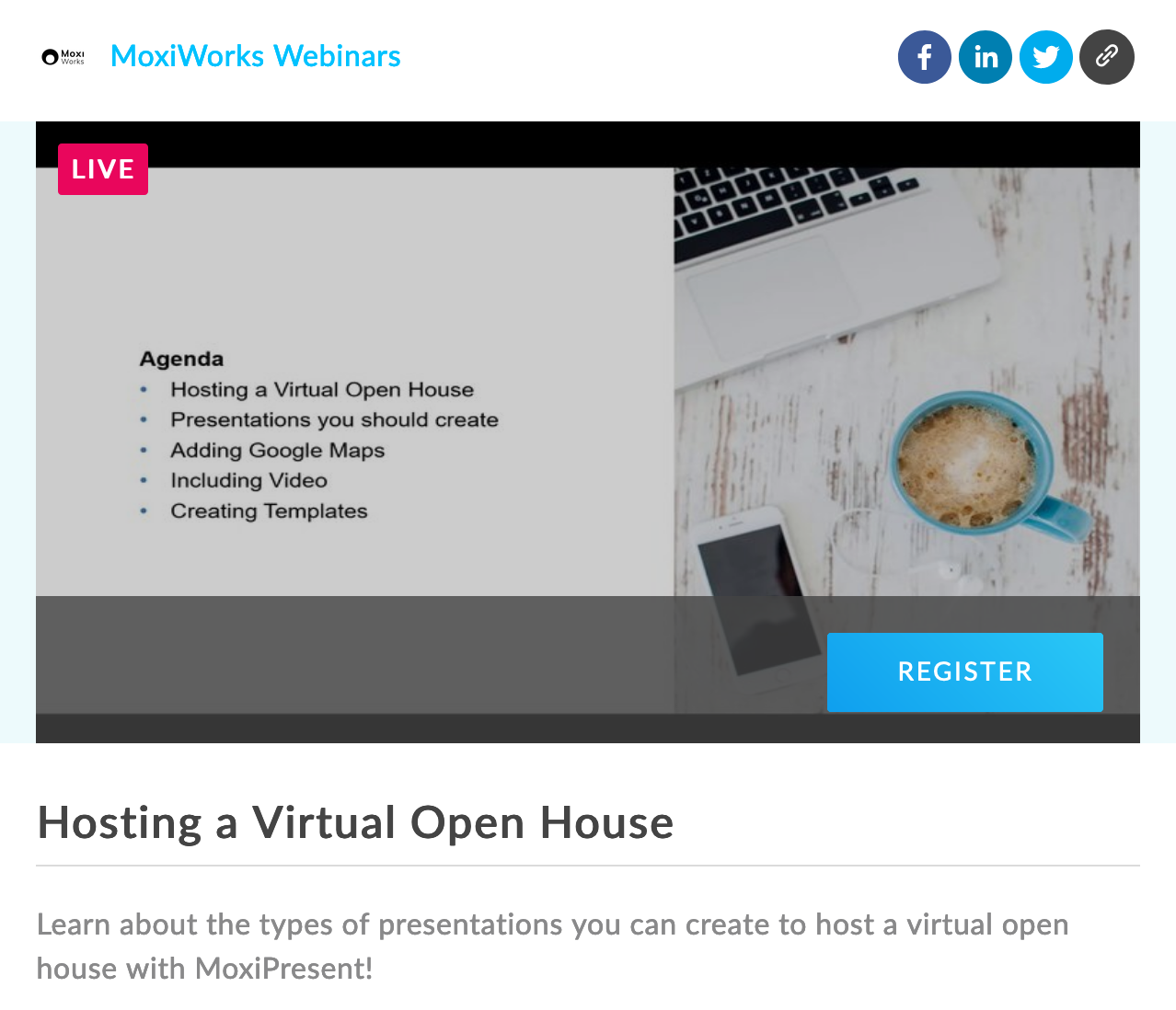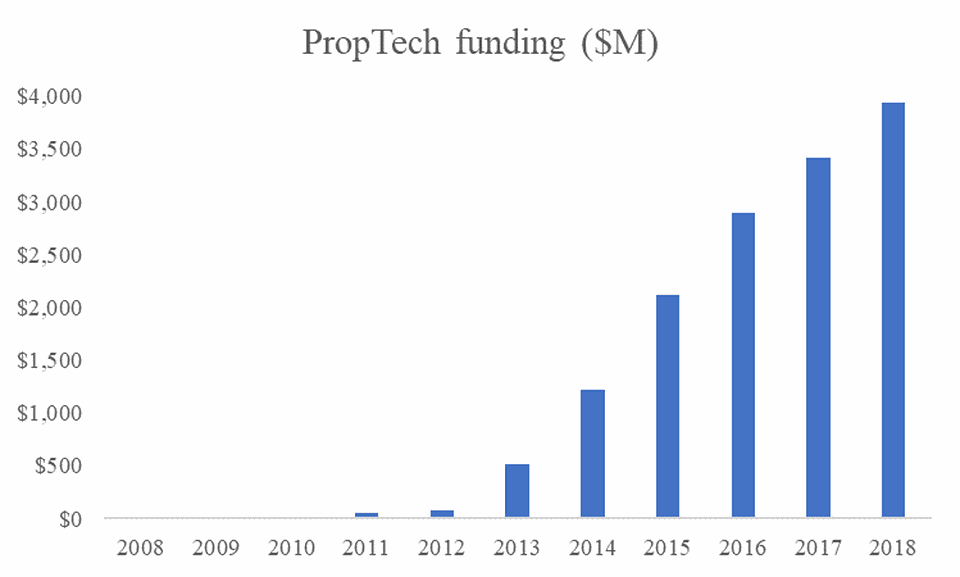Understand more. Fear less: Real Estate and the Coronavirus

Real estate leaders, what do we do now?
It’s a wave we have to ride out, but we don’t have to do it alone. Every industry is being driven into mass-tech-adoption at a rapid speed due to social distancing and isolation. Real estate is no exception, but the key difference is we’re already able to handle this.
I had the pleasure of wrapping up the LeadingRE Annual Conference in Las Vegas last week with a presentation on why every real estate brokerage is a tech-enabled brokerage — a claim that some companies are trying to use as differentiation and value-position to compete for talent. But honestly, do you have a cell phone, perhaps you’re even reading this article on your phone right now? You, as a human, are tech-enabled and therefore so is your business.
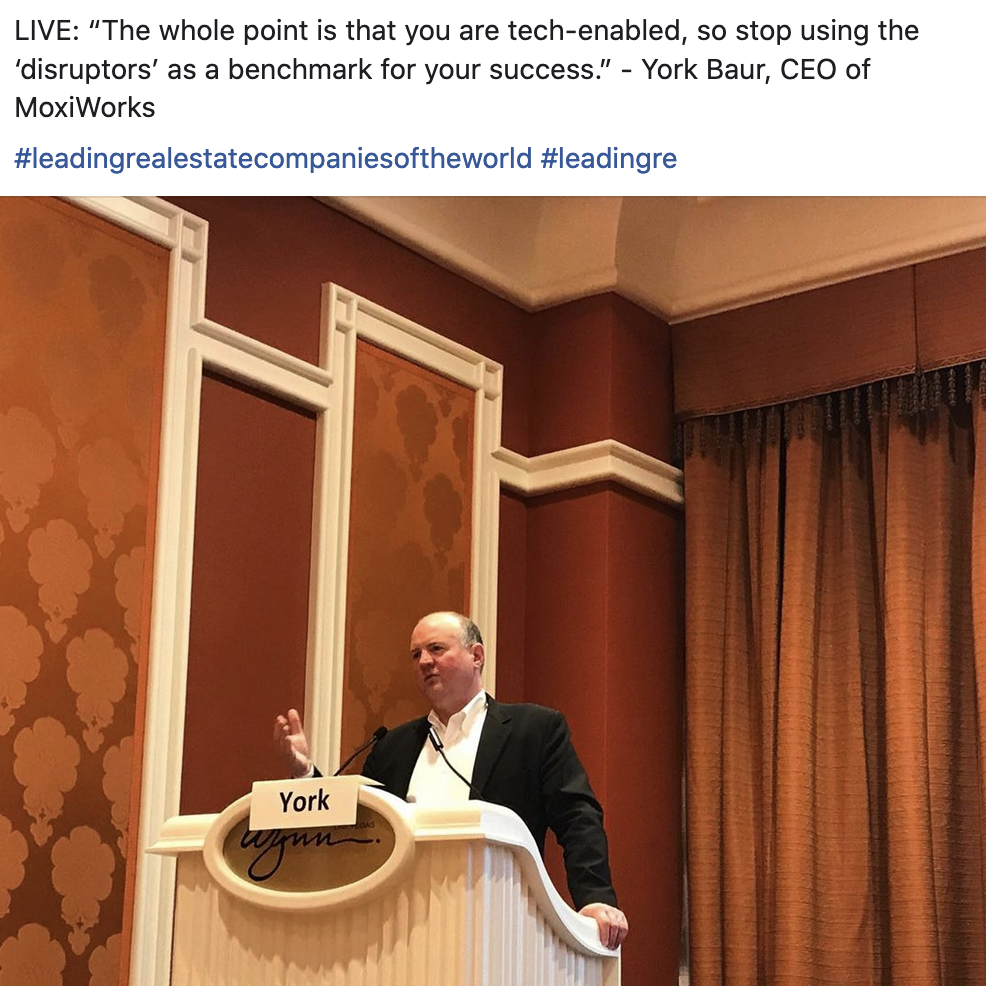
And if you’re tech-enabled, you’re also a virtual brokerage. Perhaps you won’t want to operate as a virtual brokerage forever, but you are capable of pivoting temporarily to best serve your agents and their clients. Fear in the face of disruption can cause us to fall back into old habits, ruts of non-productivity, or drive us to seek control in the minutia around us.
“Nothing in life is to be feared, it is only to be understood.
Now is the time to understand more so that we may fear less.”
– Marie Curie
A strong woman with wise words, Marie Curie’s quote can remind us that by focusing on the truth we will get through this and recover. As I always say, data tells the truth and data sets you free. In this article, I want to focus on a quick look at our industry’s economic history, what industry leaders need to be doing right now, and my 3 B’s for the time-being: Be Optimistic, Be Supportive, Be Productive.
Going Virtual Brings Us Together
On a ship over rough water, a captain can’t stay silent. At no point during this situation is it possible for brokers to over-communicate with their agents. No one has all the answers but talking it through always helps build confidence and trust.
Everyone is leaning into video communication. We still get to see each other’s smiling faces while preserving our goal of safety. Brokers, leaders, reach out to your sphere with one-on-one video calls. It’s 2020, we’re all capable of having a video chat, and it bridges one more gap that a standard phone call can’t provide. We’re telling agents to keep in contact with their clients, their sphere, their community. Practice what you preach, right? Call your agents, call your staff, call your partners.
Remote work employees have been facing the hurdle of building camaraderie without physical closeness in the workplace for years. At MoxiWorks, we have moxians and partners across the country bridging the gap. Now, we all have gotten a taste of that world — sitting in your house trying to have a meeting as the dog howls at a bird or your children forget their inside voices. The silver lining is this gives us all an opportunity to be sympathetic and supportive of each other.
We’re living this at MoxiWorks for several weeks now, with the entire company working remotely without any service interruption. We have the obvious advantage of being a technology company which helps, but we face the same cultural challenges that you. That’s why I’m saying that over-communication is so important. It’s human nature to fill in a void with the worst possible scenario and without communication, that’s exactly what your stakeholders will do. Don’t let there be a communication void – fill it with honest, transparent, supportive but optimistic communication. It’s not about having all the answers because none of us have them right now, it’s about being present as a leader.
Real Estate’s Response in Bear Markets
While the United States hasn’t entered a bear market due to viral outbreak before, it can be comforting to look at how we’ve bounced back from drops in the past. The good news? Event-driven drops (like our current situation around COVID-19) in the market are typically acute and recover much faster than structural drops (think 2007 Great Recession).
Goldman Sachs sent out a report on looking at severe declines, length in a down market, and time to recover/stabilize.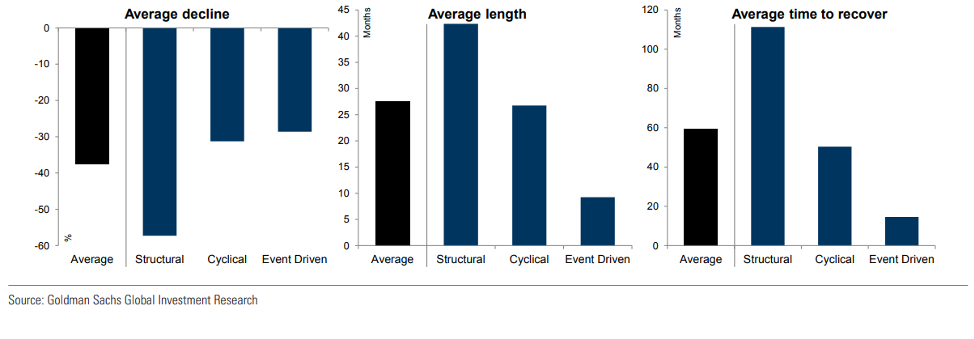
Make no mistake, this is an unprecedented time in history for everyone, but this is a storm we can weather in the real estate industry. MoxiWorks is proud to work with the strongest partners and clients, companies that survived through the housing bubble bursting and are going to pivot, survive and thrive again.
Real Estate Leaders, here’s what we do.
With that said, this isn’t a time to sit still. This is the time to link arms and lift each other up. In our MoxiWorks Town Hall we held virtually this week, I told all of our moxians: Be Optimistic, Be Supportive, and Be Productive. I’ll give you that very same advice.
- Be optimistic that local markets will bounce back, that your pipeline clients will still be ready when bans and restrictions lift. Be optimistic that your agents are solvent and with time, will help your business flourish again.
- Be supportive of each other, we are all humans in this together. Everyone needs time to reflect, to understand, to acclimate — but the speed we are moving at is going to be fast, so we need to help each other. This is a great time for fostering collaboration.
- Be productive no matter what. Give yourself a few seconds to catch your breath, then get back to work. Work on your sphere, evaluate your data, clean up your business and keep moving forward. We’ve got this. We’ve got moxie.
Competition, new players, technology — every disruptor you’ve faced before has trained you for this whether you knew it or not. Don’t let fear bring you to a crushing halt. Business has always been about inertia: an object in motion stays in motion. Like Marie Curie said, now is the time to learn more so we can fear less.
Let’s do this together,
York Baur
CEO, MoxiWorks
P.S. On that note, at Moxi we’re going to go above-and-beyond to bring continued content for our clients and the industry. We’re kicking this content release off with a guide on how to host an ‘open house’ virtually using our MoxiPresent / M Present product. Check it out.
How Much Are You Really Spending on Tech? 6 Critical Questions to Ask


Software solutions for real estate brokerages abound. As you look at your options, initial price and implementation are likely top of mind. But these factors only tell part of the story — you’ll want to understand your total cost of ownership (TCO) before you decide on the right solution for your business. Be sure to get answers to questions in these six critical areas before you sign on.
6 Big Questions to Ask Every Real Estate Technology Vendor About TCO.
1. Will this software grow with my company’s goals?
Now that Software as a Service (SaaS) dominates in most industries, you are less likely to run into a purchase becoming outdated. However, does the software provider know their future intentions? Or, does this product seem like a quick-fix, a bandage, for your existing problem?
What questions should you ask about the “expected lifetime” of the software?
- Is this a new product, or has it been on the market for quite some time?
- What new products does the vendor have in the pipeline that might replace the one you are considering?
- How long do they plan to support the existing product?
2. Does the software come with usage limitations, and how do the limitations work?
If you don’t plan ahead there can come a point in your average daily usage that you find a limitation in the software. What does “typical” usage look like, and what are the costs if we exceed usage limitations?
- How many users can I have per license?
- How many devices can run the software at the same time?
- Can we access the software from both the desktop and mobile?
- Is there a limit to the amount of data storage?
3. How easy is the software to use?
Questions about ease of use apply to many aspects of how your brokerage will implement a new solution and they are important to ask ahead of time. This will help you better frame how your staff and agents will continue to embrace it over time. Be sure to understand the nitty-gritty about customization, data migration, implementation, adoption, initial and ongoing training, and expected timelines for each of these pieces. These items could affect the actual cost of the software as well as the enthusiasm of your agents and administrative staff. You want happy, engaged team members who can readily put the new tools to work.
Here are the questions you should ask about the software’s ease of use:
- How easy is it to onboard?
- What is the average time it takes for new clients to implement and start using the software?
- What is the time investment for the initial training?
- How much ongoing training is included?
- How difficult is data migration?
- How long does data migration take?
4. What should we plan for in terms of in-house maintenance requirements?
When considering the total cost of ownership, you need to look at how you will handle the inevitable upgrades over time.
Questions you should ask regarding ongoing maintenance:
- Do we need to have a dedicated in-house maintenance person?
- How hard will it be to maintain our software?
- Do we pay more for software updates or bug patches?
- At what point would we need to upgrade our licenses?
5. What kind of technical support will we need in order to use the software every day?
Even with the most user-friendly software, glitches, frozen screens, and technical issues happen. And let’s face it — real estate agents exist all over the tech-savviness spectrum. You’ll want to understand what’s promised for basic support and troubleshooting and whether you’ll need to make an additional investment to assure broad-based usage.
Questions you should ask about support and troubleshooting:
- What type of support is offered with our license?
- Is there a time frame or a limited number of support hours we get with our package?
- What happens if an agent has trouble with the software? Are we charged per call?
- How easy is it to reach a support person? What hours is support available?
6. How secure is our data, and what happens in the case of a disaster or downtime where we can’t access our software?
What safeguards does the software vendor have in place to help you keep your business safe, secure, and operational through any situation? The real estate industry is fast becoming a high-risk target in identity theft and wire-fraud schemes. You want to ensure you’re aligning with partners that take security seriously.
Questions you should ask about security, disasters, and potential downtime:
- What kind of security is included with our licensing?
- Are automatic backups included?
- Do we need to purchase additional external or cloud storage?
- Will we need to hire an additional security service provider for our software?
- Will we be able to access our data during a natural disaster?
- Software downtime affects our efficiency and agent productivity; what assurances do we have about software connectivity?
Ask these questions about any real estate software solution you are seriously considering. You’ll get important answers, and you’ll also help the vendor you eventually choose support you more constructively. And when you ask the vendor about data responsibilities, support, troubleshooting, ease of use, maintenance, and expected lifetime, you can better estimate the TCO of your new software. If a vendor doesn’t have an answer, you may want to go with a provider who already has these processes — and more — covered.
Brokers Guide: The Total Cost of Ownership of Real Estate Software


Georgia Perez, VP of Business Development and Product Evangelism | Feb. 12, 2020
It’s no secret when considering a software purchase for your business, price is top of mind. If you’re going to spend money on a resource, it has to deliver a certain amount of value, making it worth the expense. But, did you know by only considering price and anticipated value you could be setting yourself up for unforeseen costs? A software investment should always be considered in terms of the total cost of ownership, or TCO.
The 411 on TCO
Gartner defines TCO as “a comprehensive assessment of information technology costs across enterprise boundaries over time.” Price only takes into account the one-time or recurring subscription fees. TCO includes additional expenses that may not initially be apparent. Simply put, TCO is the aggregate of all costs–either direct or indirect–related to buying, implementing, and managing a software solution over its entire lifecycle.
According to TechnologyAdvice, TCO should be the ultimate driving force behind your purchasing decisions. According to TechnologyAdvice, a TCO analysis is vital “because it determines your ROI. Without a TCO analysis, software can surprisingly cost a business upwards of 5-8x the original purchase price. This difference in expenses can significantly affect a business, its ROI, and overall success and/or livelihood.”
Being able to understand how much software is going to cost your business over the long term will ultimately enable you to make a more confident purchase decision and achieve the strongest ROI.
In this guide, we’ll walk you through the various factors to consider when contemplating a software investment and the components that should go into a TCO analysis.
Searching for Software: Two Common Mistakes
It’s imperative to properly perform a TCO analysis to find the ideal technology platform. But, before diving into what should be considered, let’s start with two common mistakes so you know what to avoid.
- Only Considering Hard Costs
The first mistake a potential buyer often makes is only considering “hard costs,” such as set-up fees, annual or monthly subscription costs, and anticipated upgrade charges. Software license and subscription costs often amount to less than 10% of the total initial purchase. - Not Forecasting for Disruption
The second mistake is not forecasting for disruption. Any software platform you choose is going to disrupt what you are currently doing so it’s important to not only prepare for that disruption time but also be on the lookout for a product that is going to be the least disruptive and most worth the disruption.
Being aware of these common mistakes and making a conscious effort to avoid them will set you up for success. Now, let’s dive into the components that should go into your TCO evaluation.
The TCO Analysis Guidebook
When performing a TCO analysis, consider the various possible costs in five parts:
When assessing software vendors, it’s critical to understand how each of their cost structures differs so you can ensure your vendor of choice is best for your business. Not all of the costs mentioned below will necessarily apply to your software purchase or specific vendor, but it’s important to be informed of all possibilities to find the software that will deliver the strongest return on your investment.
1. Acquisition Costs
Acquisition costs can be defined as the cost of acquiring the hardware and/or software needed to use the platform of choice. Think of acquisition costs as the one-time, yearly, or monthly price of the software itself. The SaaS pricing model typically includes a fixed one-time fee along with a recurring fee that varies with usage.
2. Implementation Costs
Implementation costs are those costs associated with set up according to your unique business requirements. These include:
- Customization – Will you need the software to be customized in some way? That may require additional development costs. Take into consideration that some systems may be naturally more customizable than others and therefore more cost-effective.
- User licenses – Many cloud-based SaaS offerings charge you based on a per-user license model. (Hint: Inquire about a bulk discount if it’s a system that will be widely used in your organization.)
- Initial training – This can often be the biggest burden of the implementation costs. But, investing in training early on is a valuable way to ensure successful implementation and continued usage.
- Data migration – If you’re transitioning from an older system, does the new vendor charge to transfer data? Be sure to ask what that process looks like and how much it costs. (Tip: you can often take care of it yourself at a much lower rate).
3. Operating Costs
These are the costs associated with keeping the software platform successfully running as your business grows. They include:
- New user licenses – As your business grows you may need to purchase new software licenses down the road. Account for that potential in your TCO analysis.
- Ongoing training – Ongoing training may also be required for existing users as a software system is updated or as those users want to increase their familiarity with the platform.
- Upgrades – While not always the case, some vendors charge for version upgrades.
- Administrative costs – Does your software of choice come with free support? Or, does the vendor charge you for support credits? Be sure to understand what that cost could look like overtime.
4. People/Resource Costs
- Administrator/internal champion – Do you have someone in-house whose full-time job it will be to maintain, support, and promote the software? Or, will you need to hire a new employee to serve as the platform’s administrator?
- Consulting – Some vendors provide consulting services at no extra cost for a few weeks or months after launch. Capitalize on this. However, in some cases, you may feel that your vendor isn’t providing enough resources, and in that case, you may have the added cost of hiring a consultant.
5. Soft Costs
A key piece of TCO analysis is accounting for “soft costs.” These are often the most overlooked parts of an analysis as they’re not easily apparent. According to Gartner, these are the indirect costs of operation that often creep up outside a planned budget. “Soft costs are critical to the understanding of enterprise costs. They represent real expenses and ignoring soft costs will generally cause TCO strategies to fail.” Here are some soft costs to keep in mind:
- Potential downtime – With cloud-based offerings, downtime is rarer than it used to be, but it’s still very possible. Consider the costs associated with not having the software and how its absence would affect your team’s productivity.
- Migration costs – What happens if a better solution comes along that you feel compelled to leave your vendor of choice? Be sure to find out how difficult and costly it is to migrate away.
- Potential disaster – What happens if your vendor goes out of business? Maybe they get acquired and can no longer service your chosen solution. It’s important to think of your vendor as more than just a technology platform. Like you, they’re a business. Do they have a strong management team? Are they well-funded? You should be confident in the vendor’s long-term sustainability before signing on the dotted line.
So, before you make a purchase decision and invest in a software platform, put together your own analysis using some of these factors. Taking the extra time to do a TCO analysis will help you truly understand the impact of your investment, ensuring that it’s on track to deliver strong ROI and lasting results.
MoxiWorks Selected as Berkshire Hathaway HomeServices Georgia Properties Strategic Technology Partner


SEATTLE, WA, December 17, 2019 – Berkshire Hathaway HomeServices Georgia Properties has chosen MoxiWorks, the leading real estate technology platform, as their technology partner, launching January 2020. This partnership will provide the Berkshire Hathaway HomeServices Georgia Properties with MoxiWorks’ best-in-class MoxiPresent CMA, MoxiEngage CRM, MoxiHub intranet, and MoxiTalent.
“After careful consideration, we have chosen to begin 2020 partnering with MoxiWorks, to empower our sales associates with a best-in-class real estate CRM and suite of solutions,” said Dan Forsman, President and CEO, Berkshire Hathaway HomeServices Georgia Properties. “It is clear that MoxiWorks is the most effective platform to help real estate agents increase their per-person productivity and that is why we have chosen them as our partner.”
With its recent acquisition of Imprev, MoxiWorks supports 260 brokerages and 340,000 agents with its suite of technology. With the highest agent adoption rate in the industry, agents on average see a 54% increase in repeat and referral business using the MoxiCloud.
“We’re thrilled to be working with Berkshire Hathaway HomeServices Georgia Properties to adopt the MoxiCloud for their agents,” said York Baur, CEO of MoxiWorks. “With our ultimate goal to enable agents to spend more time nurturing client relationships, we know this will be a meaningful partnership all around and we can’t wait to get started.”
Berkshire Hathaway HomeServices Georgia Properties joins several other sister companies in the industry already seeing success with MoxiWorks including Long & Foster Real Estate, Berkshire Hathaway HomeServices Chicago (formerly KoenigRubloff), Intero Real Estate Services, Ebby Halliday Realtors, and Chase International to name a few.
About Berkshire Hathaway HomeServices Georgia Properties
Berkshire Hathaway HomeServices Georgia Properties has over 1,650 associates and 26 locations across the Greater Metro Atlanta and North Georgia area. The company generated over $4 Billion in sales volume and 12,016 transaction sides in 2018. Trendgraphix reports that Berkshire Hathaway HomeServices Georgia Properties is ranked #1 in home sales for the Greater Metro Atlanta area. Led by President and CEO Dan Forsman, the organization offers a full suite of real estate services including residential real estate, luxury real estate, new homes services, condo/ high-rise services, commercial real estate, corporate relocation, property management, mortgage lending, title and settlement services, home warranties and insurance. Equal Housing Opportunity. Visit www.BHHSGA.com.
About MoxiWorks
MoxiWorks is a comprehensive open platform system for large residential real estate brokerages that serves over 260 brokerages and 340,000 agents nationwide that account for more than 13% of the transactions in the U.S. MoxiWorks’ customer retention over the past seven years stands proudly at 96%. Their integrated tools are centered on sphere methodology that increases agents’ repeat and referral business by 54%, while lowering overall technology, training, and support costs for the brokerage. The open platform known as the MoxiCloud has tools from more than 50 partners that integrate to create unique brokerage solutions. MoxiWorks also powers the LeadingRE Cloud. Find more information at moxiworks.com.
MoxiWorks – Let’s sell more homes together
###
For more information on this topic and other press inquiries at MoxiWorks, please contact Jordan Barrish at Jordan.barrish@moxiworks.com.
Zillow Veteran Joins Tech Leader MoxiWorks to Continue Strong Growth

SEATTLE, December 3, 2019 – MoxiWorks, the leading real estate technology platform, today welcomes thought leader Bret Calltharp to its business development powerhouse. Calltharp previously served as Zillow Group’s Industry Outreach Director and brings over 15 years of extensive real estate knowledge to the team.
“My greatest joy over the years has been connecting with incredible broker and agent entrepreneurs and helping them improve strategy, systems, and bottom lines,” said Calltharp, now Director of Business Development at MoxiWorks. “I knew I wanted to get back into the trenches and work more closely with the people that are the heart of this industry, so over the past few months, I met with a wide array of franchises and PropTech firms searching for the right opportunity.”
“After meeting with York, Georgia, and the rest of the team, I felt right away that MoxiWorks was my new home,” continued Calltharp. “MoxiWorks’ people, products, and most of all, passion, made it feel like the perfect fit. They’re in amazing growth mode, especially with the recent acquisition of Imprev, and I feel incredibly aligned with the vision of helping brokerages and agents via real estate tools that agents actually want to use.”
A Kansas native, Calltharp entered the real estate industry in Southwest Florida, first in luxury property management before moving to residential real estate in 2004. He worked driving business development and talent attraction at RE/MAX franchise groups in the U.S. and Canada, later joining Realogy/Better Homes and Gardens Real Estate as Director of Talent Attraction and Consulting before moving to Zillow Group in 2018.
Calltharp is an Inman News Contributor and has been featured in the National Association of REALTORS® REALTOR® Magazine, REAL Trends LORE Magazine, and the Huffington Post. He is a five-time Inman Ambassador selection and has spoken at multiple RE/MAX, Better Homes and Gardens Real Estate, and other Realogy-brand conferences, as well as Inman Connect.
“I’m so thrilled to have Bret join the MoxiWorks family,” shared Georgia Perez, VP of Business Development and Product Evangelism at MoxiWorks. “Bret will be adding his considerable talents and deep knowledge of the Real Estate industry to the Moxi sales team. In Bret’s prior roles at both Zillow and BHG, his primary focus was developing productivity, profitability and success strategies for their affiliates. This is exactly what we do at Moxi, and we are delighted to have Bret. His experience in the industry allows him to understand the challenges
that brokers, and agents face every day and recommend flexible solutions that are tailored exactly to their needs. He’s going to accomplish amazing things.”
About MoxiWorks
MoxiWorks is a comprehensive open platform system for large residential real estate brokerages that serves over 260 brokerages and 340,000 agents nationwide that account for more than 13% of the transactions in the U.S. MoxiWorks’ customer retention over the past seven years stands proudly at 96%. Their integrated tools are centered on sphere methodology that increases agents’ repeat and referral business by 54%, while lowering overall technology, training, and support costs for the brokerage. The open platform known as the MoxiCloud has tools from more than 50 partners such as RealScout, DocuSign, Buyside, QuantumDigital, MoveEasy, and more that create unique brokerage solutions. MoxiWorks also powers the LeadingRE Cloud. Find more information at moxiworks.com.
MoxiWorks – Let’s sell more homes together
###
For more information on this topic and other press inquiries at MoxiWorks, please contact Jordan Barrish at jordan.barrish@moxiworks.com.
MoxiWorks Acquires Imprev, the Best-in-Class Marketing Automation Service

SEATTLE, November 12, 2019 – MoxiWorks, the leading real estate technology platform, today announced it has acquired Imprev, the best-in-class provider of real estate marketing automation services. Financial terms of the transaction were not disclosed. This follows the recent addition of Vector Capital as a significant financial investor.
Imprev’s marketing service fully automates the creation of digital, social media, and print property marketing materials throughout the lifecycle of a brokerage’s listings, ensuring optimum marketing practices and brand consistency across the brokerage. Imprev and MoxiWorks already share a deep integration and will now operate as one entity.
York Baur, CEO of MoxiWorks, said, “This unique partnership is highly strategic and benefits Imprev and MoxiWorks’ employees, and most importantly, our collective customers. It is in the truest sense, a win-win for everyone.”
This acquisition furthers MoxiWorks’ mission to become the premier open platform for the entire real estate industry. Customers of both companies should expect to enjoy all current services without disruption.
“Imprev has always put brokers and agents first. Our focus on customers has been the key to Imprev’s success and was an absolute requirement when selecting the team to take Imprev into the future. In MoxiWorks we found the same entrepreneurial and customer centric DNA as Imprev and we look forward to seeing our technology continue to scale with the full support of MoxiWorks and Vector Capital,” said Renwick Congdon, founder and CEO of Imprev.
Robert Amen, Managing Director of Vector Capital, said, “We are pleased to support MoxiWorks’ acquisition of Imprev as it continues its relentless focus on its customers, client satisfaction, and deep, cross-industry relationships. Imprev enhances MoxiWorks’ technology and product offering and furthers the company’s ongoing mission to make real estate technology more automated.”
Adding Imprev’s marketing automation to MoxiWorks’ sphere-based CRM, MoxiEngage, leading CMA interactive presentation product, MoxiPresent, recruiting system, marketing suite, websites, intranet, and the renowned MoxiCloud open platform, will continue efforts to help brokers, agents, and teams increase productivity, lower costs, and better manage the home buying and selling processes.
Baur added, “We are thrilled to welcome each and every member of the Imprev team to MoxiWorks (as Moxians!) and are excited to start 2020 with all engines roaring. We are looking forward to seeing all that we can accomplish together.”
About MoxiWorks
MoxiWorks is a comprehensive open platform system for large residential real estate brokerages that serves over 80 brokerages and 130,000 agents nationwide that account for more than 13% of the transactions in the U.S. MoxiWorks’ customer retention over the past seven years stands proudly at 96%. Their integrated tools are centered on sphere methodology that increases agents’ repeat and referral business by 54%, while lowering overall technology, training, and support costs for the brokerage. The open platform known as the MoxiCloud has tools from more than 50 partners that integrate to create unique brokerage solutions. MoxiWorks also powers the LeadingRE Cloud. Find more information at moxiworks.com.
About Imprev
Many of the most respected brands in real estate trust Imprev’s Marketing Automation Services to set themselves apart from their competition. With Imprev, brokerages automatically create and continually update fully-branded print, digital, and social media marketing packages for all their agents’ listings, giving them a recruiting edge and driving unprecedented brand consistency. Launched in 2001 and constantly updated, the Imprev platform powers the marketing centers for hundreds of brokerages and franchises—representing over 20% of real estate agents in North America—including franchises RE/MAX, LLC, Coldwell Banker® Real Estate, Corcoran Group, and NextHome, as well as top brokerages including Douglas Elliman Real Estate, Berkshire Hathaway HomeServices Fox & Roach, Edina Realty, and Hunt Real Estate. Imprev also powers marketing automation for Homes.com. Discover more at www.imprev.com.
###
For more information on this topic and other press inquiries at MoxiWorks, please contact Marc Chouaniere at marcc@moxiworks.com.
API Nation: MoxiWorks Onboarding Just Got Even EASIER
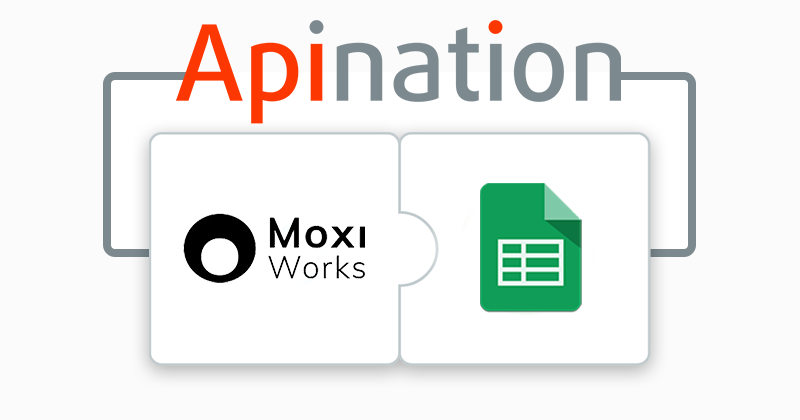
By Tiana Baur, Marketing Manager
October 30, 2019

In our forever quest to provide the best tools, services, and experience to our clients, we continue to grow and expand the MoxiCloud open platform. For us, making onboarding easy is a major priority and we’re proud of just how easy that process has become. However, like technology, onboarding can always get better and faster as well, which is why we’ve partnered with API Nation to make our easy onboarding process even easier.
How it Works
Changing technology solutions can be hard, especially when you have to move over years and years of contacts, that sometimes even exist in different places. Now you can bid tedious file work adieu. Instead of having to go through the often-painstaking process of moving over your own contacts to a new CRM, API Nation quickly and accurately syncs them into your MoxiEngage CRM account for you!
Agents can bring over full contact information, including notes and custom fields (yay!), and API Nation automatically imports and ensures 100% integrity of that data, so agents can rest easy knowing that every important piece in their sphere is in MoxiEngage and ready to go. That means all of your client’s birthdays, house-iversaries, and more will seamlessly move into your new CRM.
The entire process only takes about two minutes to set up and one minute to complete. We know, how fast, right?! If you’re currently a user of MoxiEngage you can try it out for yourself here!
More on how this integration works here.
More on API Nation
The heart and soul of API Nation is very similar to that of MoxiWorks, which is what makes this partnership and integration that much more exciting! Since launching, API Nation has been working to connect software systems and expand their power and reach by building and automating workflows between them.
From sharing contacts with marketing systems, pulling real estate listings from MLSs into brokers’ tools, to automating e-commerce orders, invoices, shipments, and payments, each app they connect, and each workflow they build, saves thousands of hours and brain cells from mundane, tedious work.
We’re so excited to have you on the MoxiCloud open platform, API Nation!
Chase International Chooses MoxiWorks to Fuel Entire Tech Suite

SEATTLE, October 23, 2019 – One of the nation’s most successful independent real estate firms, Chase International, has chosen to expand its relationship with MoxiWorks, a leading real estate technology company. The expansion includes an entire suite of MoxiWorks products, including MoxiEngage CRM, MoxiWebsites, and MoxiHub intranet, which will accompany their existing tools, the best-in-class MoxiPresent interactive CMA tool and MoxiMarketing, easy online advertising for listings and services.
“We’ve long enjoyed working with Chase International, who have had incredible success with MoxiPresent, and are thrilled to be adding the full suite of MoxiWorks products which will have an immense impact on their agents’ productivity,” said Georgia Perez, VP of Business Development and Product Evangelism at MoxiWorks. “Julie Kozich, who joined Chase earlier this year as their Chief Real Estate Officer, has driven massive gains for her prior companies using the MoxiEngage productivity CRM, and we feel very fortunate to be working with Julie again to benefit Chase.”
Their new CRM tool, MoxiEngage, is proven to increase an agent’s business by 54% on average, while their existing CMA presentation tool, MoxiPresent, enables agents to enjoy 43% more transactions each year. Together with MoxiWebsites, MoxiHub, and the best performing ads tool on the market, Promote by MoxiMarketing, agents are guaranteed to up their productivity and in turn, their sales volume.
York Baur, CEO of MoxiWorks, said, “We’re very excited that Chase International decided to expand their partnership with us and onboard more Moxi goodness that will help their agents achieve greater success in their real estate businesses and help them delight their clients time and time again.” MoxiWorks’ dedication to their clients is proven through their customer retention over the past seven years, which stands proudly at 96%.
Perez added, “Chase International has a stellar brand that is equated with luxury and excellence in Lake Tahoe and the surrounding communities. They have an amazing corporate culture, and truly love and support their agents in building the businesses of their dreams.”
About Chase International
Chase International is the #1 real estate firm in the Tahoe-Reno region. Founded in 1986, Chase International is a dynamic real estate firm with a heart-centered approach, committed to the success of its clients, sales associates, staff and community. With more than 350 professional Realtors® representing homes at all price points, the company is proud to be the market leader, achieving the highest 2018 volume in the region with nearly $1.4 billion in sales. The company currently operates nine offices in Zephyr Cove, Glenbrook, Incline Village, Carson Valley, South Lake Tahoe, Tahoe City, Truckee, Reno, and Sparks, as well as a marketing and PR firm in London. With powerful international connections in place, Chase listings receive maximum industry exposure to potential purchasers worldwide. For more information about Chase International, visit ChaseInternational.com.
About MoxiWorks
MoxiWorks is a comprehensive open platform system for large residential real estate brokerages that serves over 80 brokerages and 130,000 agents nationwide that account for more than 13% of the transactions in the U.S. MoxiWorks’ customer retention over the past seven years stands proudly at 96%. Their integrated tools are centered on sphere methodology that increases agents’ repeat and referral business by 54%, while lowering overall technology, training, and support costs for the brokerage. The open platform known as the MoxiCloud has tools from more than 50 partners that integrate to create unique brokerage solutions. MoxiWorks also powers the LeadingRE Cloud. Find more information at moxiworks.com.
###
For more information on this topic and other press inquiries at MoxiWorks, please contact Tiana Baur at tiana@moxiworks.com.
Brace Yourselves: Industry Consolidation is Coming

By York Baur, CEO of MoxiWorks
October 22, 2019

As we race towards 2020, we find ourselves in the late stages of the longest market expansion in United States history, which has led to some of the largest sums ever invested into real estate technology. To put things in perspective, back in 2008 there was only $20 million invested, whereas today that number sits comfortably around $4 billion.
While this is generally a good thing, there is a major thorn in the side of it all: the fact that the early projections for many companies of the amount of investment it would take to achieve success was wildly inaccurate.
Assumptions vs. reality.
The data challenges in residential real estate, combined with the investment required for enterprise-class systems, mean that many companies have underestimated the investment needed to achieve scale and profitability. Not only that, but many technology companies chose to sell directly to real estate agents because to them it looked like a shorter path to revenue. Unfortunately, that carries with it a massive customer churn and high customer acquisition costs, both of which limited the ability to get to meaningful revenue.
All of this makes for many, many companies in the real estate technology struggling to raise money and remain viable. The problem is, how can you tell who will survive and thrive and who will be hanging on for dear life or worse yet, gone altogether?
Brokerages beware: You must vet your technology before you sign the dotted line.
To all brokerage customers out there, beware – you need to research the financial health and financial backing of your vendors or it might end badly. The key is choosing an open platform vendor so that you have flexibility to change products out easily if and when they fail. None of us, me included, can truly know who will win and lose in the technology race so you need to protect your brokerage and agents for whatever the outcome may be.
Industry Consolidation + Risk Aversion
With the recent news of the Soft Bank’s WeWork disappointment and a very uncertain future for their other real estate investments and endeavors, we are going to start seeing risk aversion on the part of investors looking at our industry. Industry consolidation is a natural thing. As everyone races one another, only a handful come out on top. When that happens, the best-in-class products will be acquired and/or merged with other best-in-class products, and those that have struggled will likely lose out.
That’s why a well-capitalized platform provider is also a safer choice because they are in the best position to acquire the companies that are struggling and produce future stability for you and your business. It’s obvious that risk aversion and industry consolidation is near, and everyone better be ready for it when it arrives.
The Hole in Your Brokerage Recruiting Strategy

By Jessie Trapp, Marketing Coordinator
October 18, 2019
 We all want to like the people we work with. We want to make sure they’ll show up on time, fit in nicely with the culture, and include deodorant as a staple in their daily routine. But here’s the thing – recruiting solely based on likability and surface-level metrics while putting the data-driven side of things on the back burner won’t take your business to new heights, especially when it comes to the ultra-unique industry we call real estate. You need specific, tailored data – a piece of this industry’s recruiting puzzle that often gets misplaced or overlooked.
We all want to like the people we work with. We want to make sure they’ll show up on time, fit in nicely with the culture, and include deodorant as a staple in their daily routine. But here’s the thing – recruiting solely based on likability and surface-level metrics while putting the data-driven side of things on the back burner won’t take your business to new heights, especially when it comes to the ultra-unique industry we call real estate. You need specific, tailored data – a piece of this industry’s recruiting puzzle that often gets misplaced or overlooked.
Here are a few tips for connecting the dots between knowing that you need to bring on new agents in order to reach your lofty goals, and using data to successfully recruit the right prospective agents to your brokerage. Use these tips to tailor your brokerage recruiting strategy:
Use real estate-specific recruiting technology.
Recruiting in real estate isn’t as simple as browsing through the endless names and grey faces on LinkedIn and sliding into a few prospects’ DMs. In fact, a survey by Capterra Talent Management states that only 36% of candidates are active on LinkedIn, meaning that using LinkedIn to recruit could actually limit your ability you find the right agents. This makes it that much more important that you use an industry-specific system that not only knows where top-producing agents can be found, but also what metrics should be used to gauge whether or not they’re a good fit for your unique brokerage.
Using real estate specific recruiting technology gives recruiters the ability to be more efficient and targeted in their recruiting efforts. It cuts straight to the chase, evaluating only the types of data that matters the most to your brokerage throughout the recruiting process.
Actually use a brokerage recruiting strategy.
It’s not enough to simply have real estate technology in your tech stack. In order to reap the benefits of this technology it must be deeply implemented into your brokerage’s recruiting systems and workflow. The managers using it must understand the expectations associated with it, and receive the training required to use it correctly.
Set your goals.
Each and every one of your recruiting goals should map to your business and revenue goals, period. That means that every agent you bring on board at your brokerage should be a step – no, a leap – towards reaching those goals.
In order for your technology to assist you in reaching your goals, you have to set them in the first place. Be sure to input the specific revenue goals your brokerage has set for itself into your recruiting system before doing anything else. This will ensure accuracy and make sure that you’re able to leverage its features to their full potential.
Use data to identify top producers.
Now that you’ve imputed your goals, it’s time to use data to find the agents you need to reach them. Use the sales data provided by your real estate recruiting tech to evaluate how agents are trending. You’re looking to grow your brokerage, and it’s important to recruit agents who hold that same hunger for growth and success, too.
Use a recruiting flow.
Once you discover the candidates you should be recruiting in order to reach your goals, drop them into a data-backed recruiting flow. Competition for top-producing agents is hot and having these insights into how you should take action can be the determining factor in being able to successfully get them on your team.
This flow should include things like:
- Prioritized tasks, so you know exactly who you should be putting your effort into first.
- Prompted actions, so you know exactly what kinds of things you should be doing.
- Guidance on timing, so you know exactly when you should be making moves.
If your brokerage recruiting strategy and efforts aren’t taking you where you want to go, make sure you’ve checked these boxes off your list of to-dos. The more you leverage real estate recruiting technology, the more seamless and effective your recruiting process will be, and the harder it will become to picture life without it.


 Facebook
Facebook
 X
X
 Pinterest
Pinterest
 Copy Link
Copy Link
